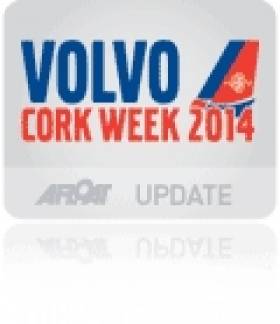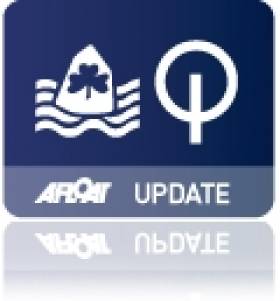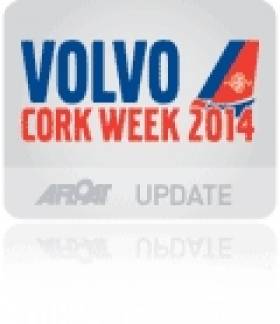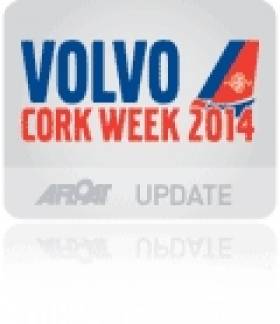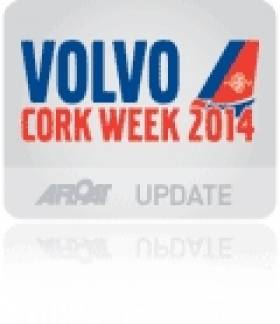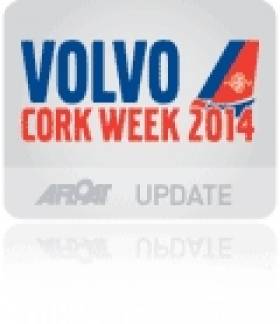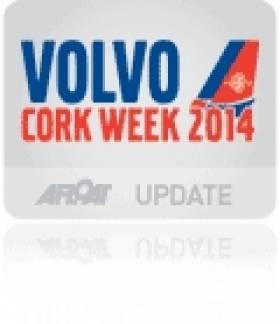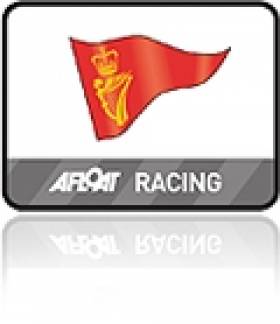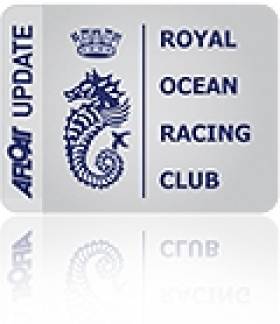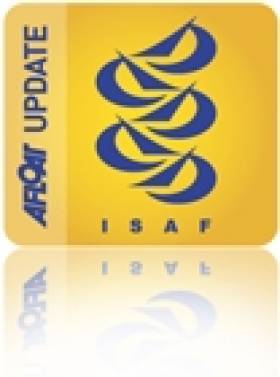Displaying items by tag: Royal Cork Yacht Club
Volvo Cork Week Day Three & The Race to Find the Pressure
#corkweek – Unsettled weather provided changeable conditions for the third day of racing at Volvo Cork Week writes Louay Habib. The day started with bright sunshine and balmy conditions, causing a short postponement for many classes and light rain (honestly!) and a stiffer breeze was encountered during the day. With many classes now completing six races, the discard has kicked in and front runners have become more apparent. What is plainly obvious from the results is races and places are being contested by seconds. Volvo Cork Week is providing exciting, close racing and ashore the craic is the same as ever.
Fleet A, composing of the fastest racer cruisers, competing in IRC One and IRC Two took on the Windward Leeward Course, which was 3 miles south east of Roches Point. Once a northerly breeze had settled, the fleet got a clean start in Race 5 racing upwind towards the shoreline. The breeze was light and the first leg proved to be crucial. Peter O'Leary was calling tactics today on Marc Glimcher's Ker 40, Catapult (Baltimore SC). "We crossed the line on starboard tack and tacked as soon as we could to head for the area of pressure on the right hand side of the course. The race was all about finding that extra pressure to get ahead of the fleet and into clear air."
Peter's brother Nicholas O'Leary is tactician on Michael Boyd's Grand Soleil 43, Quokka (Royal Irish YC). "Mark Mansfield on the wheel and myself were in total agreement that the right would pay" commented Nicholas. "We had both seen this scenario in the 1720 Nationals and it was clear to us."
Catapult scored their fourth win in a row in Race 5 and ended the day leading IRC One for the series by six points. Andy Williams' Ker 40, (Yealm YC) won Race 6, to move into second position on countback, from Richard Matthews Hakes 42, Oystercatcher XXX (Royal Burnham YC).
Quokka were unstoppable today, winning both of today's races to open up an 8.5 point gap for the series in IRC Two. Tony Ackland's Dubois 37, Dark Angel (Swansea YSC) is still in second place but a solid performance by Conor Phelan's Ker 37, Jump Juice (Royal Cork YC) has lifted the team up to third.
Fleet B, consisting of IRC 3, IRC 4, IRC 5 and the Sportsboat Class enjoyed three races on the Olympic Course, near Roches Point. with over 40 yachts racing on a tight triangular course.
In IRC Three, Pat Kelly's J/109, Storm (Rush YC) still leads the class after an intense battle. Robert McConnell's, A35, Fools Gold was the winner in Race 5. The intensity of the combat was evident by the top four yachts were only separated by an astonishing 12 seconds. Last year's class champion, Ian Nagle's J/109, Jelly Baby (Royal Cork YC) was the winner of Race 6 by just 23 seconds from Storm. However, the Kelly family racing Storm, finished the day on top by winning the last race of the day.
"The Olympic Course is a real test, especially the gybe mark, where yachts are converging for a manoeuvre all at the same time. Just a few seconds can make the difference between first and fifth." Explained Joss Walsh, trimmer on Storm. "The overall game plan was to keep with the yachts around us and try and compete with them for speed and avoid errors, which would be very costly. Pat Kelly has four sons on board, Storm is a real family boat but we are quite a heavy crew, which has made racing difficult in light conditions. We are all here to enjoy very competitive racing and a few pints at the club afterwards. We are here to win but having fun is just as important."
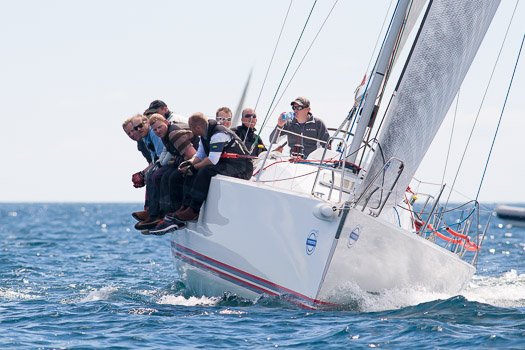
Former ICRA National Champion Storm leads IRC 3. Photo: Bob Bateman
Storm leads IRC Three by 10.5 points points from Paul O'Higgins Corby 33, Rockabill V, (Royal Irish YC). Jelly Baby is just half a point behind Rockabill V in third.
In IRC Four, Tim Cunliffe's Half Tonner, Insatiable (Royal Cornish YC) is the new leader having scored a 1,2,3 in today's three races. Paul Tingle's Corby 25, Alpaca (Royal Cork YC) has dropped to second place after struggling on today's Olympic Course. Peter Deasy's Bad Company (Royal Cork YC) had their best day so far, scoring a 4th and a win to move up to third in class. Ronan Fenton's J/35, Sky Hunter (Blackwater SC) finished the day in style, taking their first win of the regatta in Race 7.
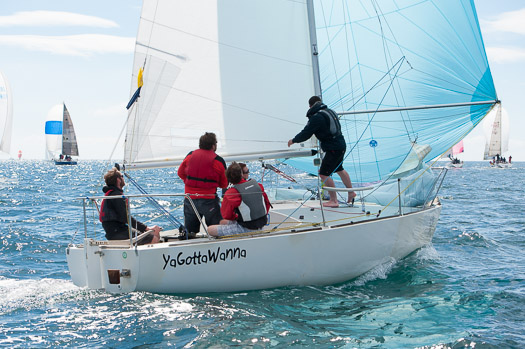
Dave Lane and Sinead Enright's YaGottaWanna. Photo: Bob Bateman
In IRC Five, it is now six straight bullets to the boys from Cobh. Jason & Domonic Losty's Quarter Tonner, Illes Pitiuises (Cobh SC). However, the team have had to fight for their supremacy, winning Race 5 by 6 seconds and Race 6 by 35 seconds. Kieran O'Connell's Quarter Tonner, Bandit (Royal Cork YC) had a consistent day to have a solid position in second place for the series. Frank O'Regan's Orient Express (Cobh SC) is the smallest keel boat at the regatta and lies third, just one point ahead of Lane & Enright's J/24, Yagottawanna (Royal Cork YC).
In the Sportsboat Class Robin & Ben O'Mahony's 1720, Spiced Beef still leads the class after scoring a third and a race win today but two yachts came into the running with excellent results today. Julian Cook's Viper 640, Oh No, won the first two races putting pressure on Spice Beef but a fifth in the last race means that Spiced Beef have a five point lead for the series. Denis Murphy's 1720, Aquatack scored three second places today to move up to third for the class, just a point behind Oh No.
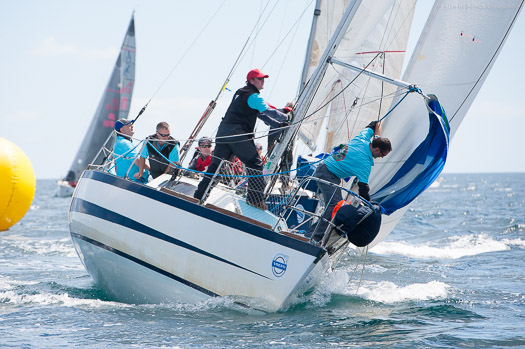
Lenny Donnery's No Knomes. Photo: Bob Bateman
In IRC One White Sail, George Pettifor's Beneteau 36.7, Foxtrot had an outstanding day in Cork Harbour, winning both of today's races to become the new class leader. John Downing's Samba drops to second place, just two points off the lead. Peter O'Donovan's X-372, X Tension scored a second and third place today to move up to third for the class.
Tom McNeice's Sigma 33, Minx III won both of today's races to open up a three point lead in in IRC Two White Sail. David Borry Crockett's Sigma 33, is second with Pat Vaughan's Contessa 33, Aramis in third.
Tonight's entertainment at the Royal Cork Yacht Club Event Village includes, traditional Bag Pipes from Sessiun Ceol followed by DJ Fadd Jnr, mixing the tunes after 10pm. Racing continues tomorrow, full results available here
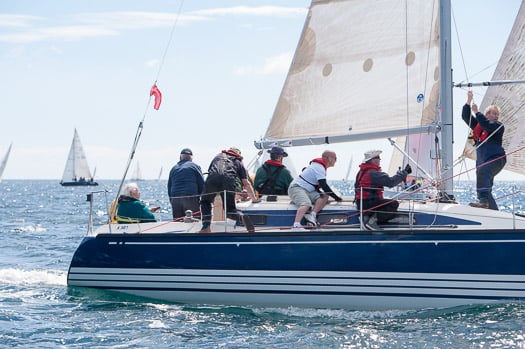
Ted Crosbie at the tiller of No Excuse. Photo: Bob Bateman
#opti – A consistent showing by Harry Durcan who never fell out of the top three, despite very tricky conditions, at last weekend's Optimist Leinster Championships gave the Royal Cork sailor the title.
Durcan will be Ireland's sole representative at the Argentinian World Championships this October.
Second place at the Royal Irish hosted eveny went to Dara Donnelly of the National Yacht Club and third place to a visiting Maltese sailor. In the senior silver fleet Paddy Cunnane from Dingle Sailing club earned his win with Sarah Fogarty and Kate Darcy second & third in Silver senior fleet.
Optimist class interest now focuses on the European Championships hosted next week at the Royal St. George Yacht Club in Dun Laoghaire.
Senior fleet results available to download below.
#corkweek – The fast high performance yachts racing at Volvo Cork Week enjoyed the unique Slalom Course today, the triangular course has an offset mark which forces the crew to gybe half way down the reaching leg, providing high octane maneuvres in close quarters with other yachts.
Marc Glimcher's American Ker 40, Catapult (Baltimore SC) was launched on the Slalom Course today, scoring three straight bullets. Catapult's crew include, Royal Cork's Harry Durcan, the teenage national Optimist Champion, who was beaming from ear to ear. However it was far from easy for Catapult, which will be representing Ireland in the forthcoming Brewin Dolphin Commodores' Cup. Each race was won by just seconds with three high performance yachts pushing hard; Richard Matthews' Hakes 42, Oystercatcher XXX (Royal Burnham YC), Andy Williams British Ker 40, Keronimo (Yealm YC) and Anthony O'Leary's Ker 39, Antix (Royal Cork YC).
"That is the first time I have raced on a slalom course although it is an idea we have thought about back home in Maryland." Commented Catapult's Geoff Ewenson from Annapolis USA. "Conventional windward lewards are more tactical but this course is all about speed, boat handling and sail selection, which is more akin to modern yachts flying asymmetric sails and it is a very exciting discipline. We were by no means faultless today but we have got to be happy with our results and racing a new course set up was very refreshing, something we all enjoyed."
In IRC Two, Michael Boyd's Grand Soleil 43, Quokka (Royal Irish YC) had another great day. Quokka won the first two race but dropped to fourth for the last race of the day. After four races, Quokka has a slender lead for the class from Tony Ackland's Dubois 37, Dark Angel (Swansea YSC). Conor Phelan's Ker 37, Jump Juice (Royal Cork YC) had a consistent day resulting in third place by the close of play. The intensity of the racing in IRC Two produced a tie for second place in the first of today's three races between Jump Juice and Dark Angel.
Fleet B, consisting of IRC 3, IRC 4, IRC 5 and the Sportsboat Class enjoyed three races on the Windward Leeward Course, three miles south east of Roches Point.Warm sunshine and stable conditions prevailed,with blue skies and fresh breeze coming off the land to provide a perfect classic race track.
In IRC Three, Pat Kelly's J/109, Storm (Rush YC) was in impressive form scoring a win and a second in today's races to open up an 8.5 point lead at the top of the class. Paul O'Higgins Corby 33, Rockabill V, (Royal Irish YC) sailed consistently well today to move up to second in class. Robert McConnell's A35, Fools Gold (Waterford Harbour SC) is third.
In IRC Four, Paul Tingle's Corby 25, Alpaca (Royal Cork YC) had a great day scoring two wins and a second, to climb to the top of the class. Tim Cunliffe's Half Tonner, Insatiable (Royal Cornish YC) finished the day in style with a win, to place the Cornishmen just two points off the lead. Ronan Lyden's Corby 25, Aurora (Royal Cork YC) scored two second places today to move up to third.
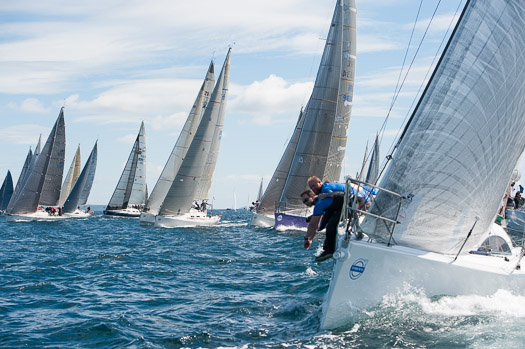
"Champagne sailing!" smiled Paul Tingle, skipper of Alpaca. "12 knots of breeze, a great course and really competitive racing. I just love Cork Week and today was a very special day to be out on the water. The Corby 25 is a step-up for us this season and she is a far more physical boat that we are used to, so in the last race, we were a little tired and let or concentration lapse but what a day! We are off for a crew dinner and can't wait to get going in the morning."
In IRC Five, Jason & Domonic Losty's Quarter Tonner, Illes Pitiuises had another cracking day, to win all three races and have the only perfect scoreline of the 100 yachts competing at Volvo Cork Week. Last month, Illes Pitiuises won the Corinthian Division of the Quarter Ton Cup in Cowes and look like they have brought that scintillating form with them to Volvo Cork Week. Kieran O'Connell's Quarter Tonner, Bandit had a good day on the water, moving the team up to second place above Lane & Enright's J/24, Yagottawanna. Dermott Foley's Anchor Challenge and Frank O'Regan's Orient Express posted good results today on the windward leeward course.
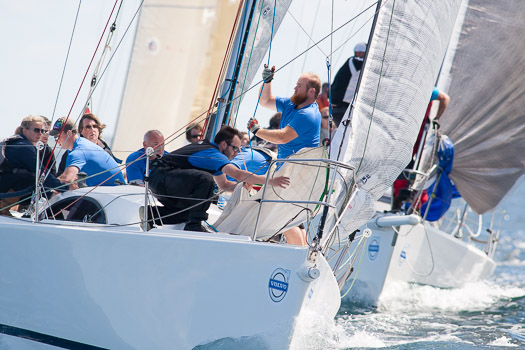
In the Sportsboat Class Robin & Ben O'Mahony's 1720, Spiced Beef still leads the class, having scored two first places today. Mike Relling's Viper 640, Viper scored their first bullet of the regatta to keep hold of second place, but by only one point, from Jimmy Nyhan's 1720, Salve racing.
John Downing's Samba leads White Sail IRC One by just two points, after winning the first of two races today. Sailed along the stunning coastline west of Cork Harbour the fleet enjoyed spectacular views in bright sunshine and a moderate breeze. George Pettifor's Beneteau 36.7, Foxtrot won the second race of the day to lift the team to second for the class. Whilst, Bryan Heffernan's Dufour 365, Aisling scored a second and a third to place third after three races. The Heffernan Family include two members in their 70s, who could not race in the spinnaker classes, a prime example of why the White Sail class is included at Volvo Cork Week.
Tom McNeice's Minx III and David Borry Crockett's Upstart are both Sigma 33S and the two yachts are enjoying incredibly close racing. Only six seconds seperated the two yachts in today's first race. Minx III and Upstart are currently tied for the lead in White Sail IRC Two. Pat Vaughan's Contessa 33, Aramis is third and a win in today's first race has lifted Clive Doherty's GK29, Phaeton to fourth.
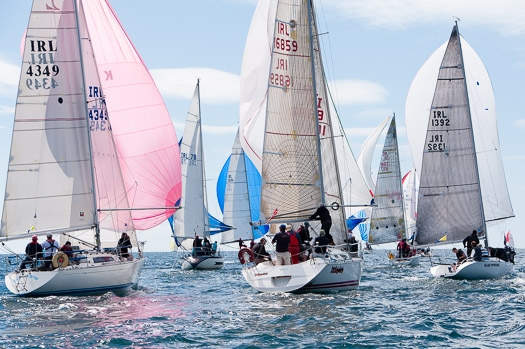
Tonight's entertainment at the Royal Cork Yacht Club Event Village includes; Samba Corcaigh Walking. Who are afloat, playing Samba drums around the pontoons. Brazil made be out of the World Cup but the party is still very much going on at Volvo Cork Week! Racing continues tomorrow,
Full results here
#corkweek – Thrilling conditions welcomed an international fleet of yachts from all over Europe and the United States to Volvo Cork Week. 100 yachts racing in Cork Harbour produced a magnificent spectacle writes Louay Habib. Cork Harbour is one of the largest natural harbours in the world and provides stunning scenery and tricky wind and tidal conditions. The gusty north easterly breeze tested the boat handling skills of the international fleet, with several yachts reporting a boat speed of up to 20 knots on the surf.
The first race of Volvo Cork Week started just outside Roches Point, the wind speed piped up to 17 knots with a short sea state. The beat into Cork Harbour had the fleet swapping tacks past Spike Island, before negotiating close tight reaching legs along the picturesque town of Cobh. For many it was a race of over three hours, before returning to the Royal Cork Yacht Club to enjoy the full facilities of the exclusive race village.
Michael Boyd racing Grand Soleil 43, Quokka (Royal Irish YC) had an outstanding race, winning IRC Two by a landslide 15 minutes on corrected time. Tony Ackland's Dubois 37, Dark Angel (Swansea YSC) was second in IRC Two, just seven seconds ahead of Jim Macgregor's Elan 410, Premier Flair (Poole YC), which made an impressive comeback after starting prematurely.
For Volvo Cork Week, Mark Mansfield (Royal Cork YC) is at the helm of Quokka. Mark sailed at four consecutive Olympics from 1992 to 2004, for Ireland, in the International Star Class.
"We got a great start, there was a wind shift just before the gun, which favoured the pin end and we had a nice approach and tacked soon after into clear air." Explained Mark. "The wind speed was up and so was the sea state and Quokka just loves those sort of conditions. Heavier than the Ker 40s, she goes well through the waves but downwind Quokka doesn't plane, so the Ker 40s got away. The crew work today was very good, especially after some last minutes calls; it's obvious that this team has been training well together for the Commodores' Cup."
Anthony O'Leary's Ker 39, Antix (Royal Cork YC) started well and played the current and the wind acceleration through Roches Point to lead on corrected time at the top mark off Cobh. Marc Glimcher's Ker 40, Catapult (Baltimore SC) helmed by Royal Cork's Olympian Peter O'Leary, took Line Honours by 27 seconds from Richard Matthews' Hakes 42, Oystercatcher XXX (Royal Burnham YC) . However, after time correction, Antix won the class by less than a minute from Catapult with Andy Williams' Devon based, Ker 40, Keronimo in third.
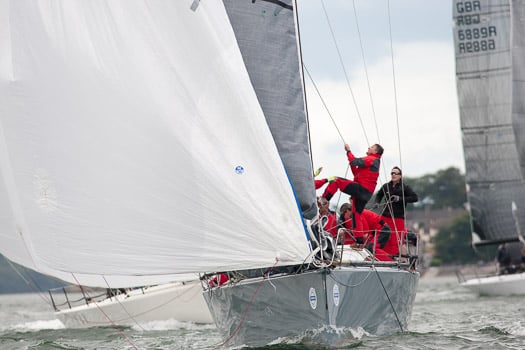
Victory in IRC Three went to Pat Kelly's J/109, Storm (XXYC). Paul O'Higgins Corby 33, Rockabill V took line honours but after time correction Storm won by nearly three minutes from Robert McConnell's A35, Fools Gold with Rockabill V third.
The IRC Four Class winner for 2012 was in fine form today. former Royal Cork YC Admiral, Peter Deasy driving Bad Company scored a slender win from Paul Tingle's Corby 25, Alpaca (Royal Cork YC). Tim Cunliffe and his team from Falmouth, racing Half Tonner, Insatiable was third.
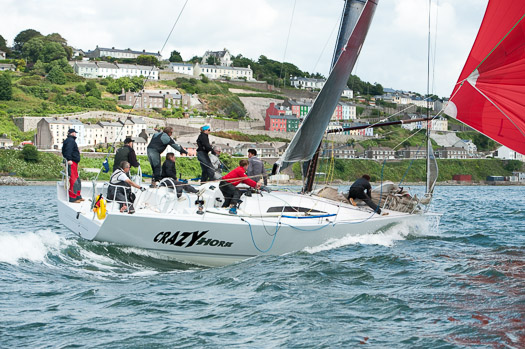
Bad Company won by just 49 seconds on corrected time. "Beautiful conditions and a really competitive race, what a great start to Volvo Cork Week." Smiled Peter Deasy. "We are delighted to see Insatiable back, we had a great battle with them last time and Paul's new boat, Alpaca, is sailing very well indeed, so we will have to be at our best to win this class."
It was a long day on the water in IRC Five, Jason & Domonic Losty's Quarter Tonner, Illes Pitiuises was the winner by just under five minutes from Dave Lane & Sinead Enright's J/24, YaGottaWanna. Christine Willis's Westerly Fulmar, Rodmar was one of the last yachts to finish today, after over four hours of racing, the team from Aberaeron SC showed great tenacity taking third in class after time correction.
In White Sail IRC One, Bryan Hefferan's Dufour 36, Aisling (Royal Cork YC) took Line Honours and the class win on corrected time from John Downing's Sunfast 32, Samba. Peter O'Donavan's X-372, Xtension (Royal Cork YC) was third.
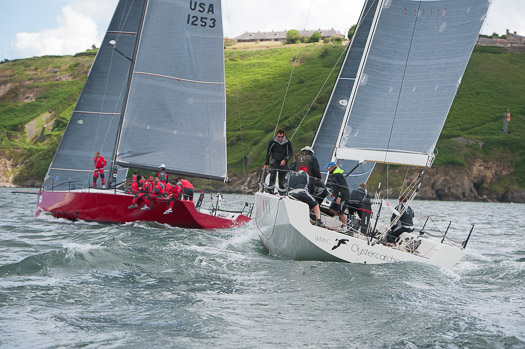
In the Sportsboat Class, Robin & Ben O'Mahony's 1720, Spiced Beef was the winner with Mike Relling's Viper 640, Viper taking second place and David Pitman's Viper 640, The Black Adder was third. Viper could have won the first race but for a navigational error. "We over stood a mark, which cost us the lead and ultimately the race." Admitted Viper's skipper, Mike Relling. "We had a real blast though, hitting 19 knots on the reach and it has been great to race against the 1720s. They definitely have us upwind but downwind the Viper is much quicker, so we expect a regatta-game of snakes and ladders, pardon the pun!" David Pitman's Viper 640, The Black Adder was third.
After racing, hundreds of competitors enjoyed a few glasses at the Royal Cork Yachjt Club with live entertainment. The SLAM Crew Games kick off tonight in the Marquee with a giant screen showing the FIFA World Cup Semi-Final between Brazil and Germany. Racing continues at Volvo Cork Week tomorrow Wednesday 8th July, with the international fleet enjoying a variety of courses both inside and outside of Cork Harbour.
For full results here
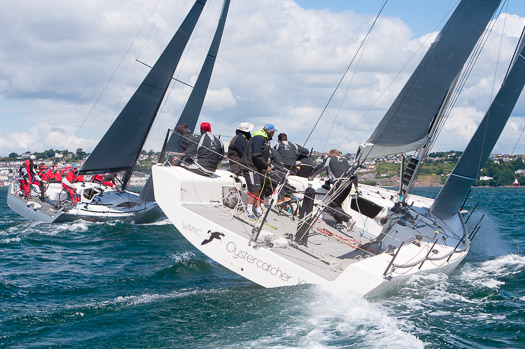
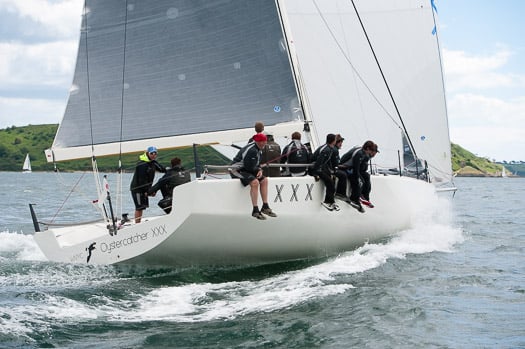
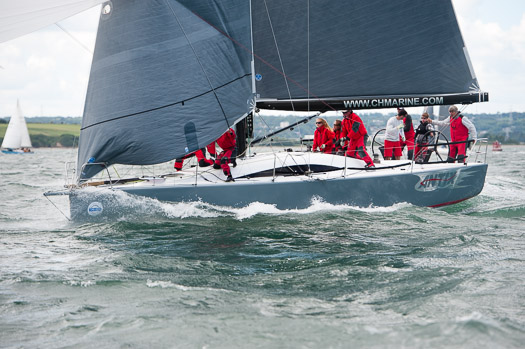
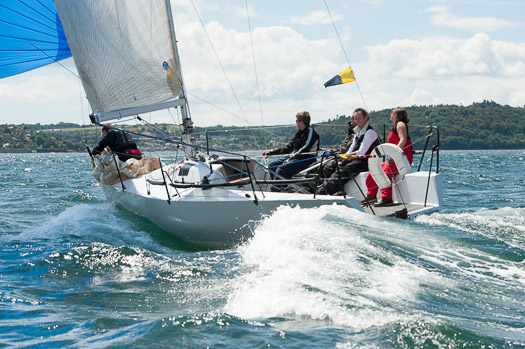
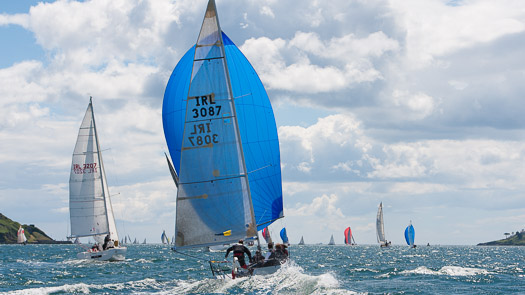
#corkweek – Crosshaven sparkled both on and off the water yesterday as all is in readiness for the official start of racing today at Volvo Cork Week 2014 writes Claire Bateman.
The aura of goodwill and smiling faces was in evidence everywhere in Crosshaven today. The Royal Cork Yacht Club was buzzing with last minute registrations of yachts still arriving, the sun shone non stop and there was a delightful summer breeze wafting around to keep the crews on the water.
Many of the yachts, particularly the visitors, took the opportunity to make an observance trip of the harbour both inside and out while others decided to take part in the practice races organized by the Race Committee and to iron out an last minute glitches in their final preparations.
Make no mistake, it is all very pleasant and amicable with a wonderful spirit of camaraderie but, just like any other sport, once the start is underway the competition comes into play.
With a good forecast for today of some 11 to 16 knots of nor westerly breeze conditions should be perfect for the in harbour race that takes the yachts up to a turning mark of Cobh and is a favourite viewing point with the general public. Given the forecast, the yachts may yet get to experience what is known as the "cathedral puff" a wind that may get deflected around the spire with sometimes interesting results!
It only remains to wish the best of luck to all competitors for a wonderful week of racing and to enjoy the extensive shoreside facilities organized for the week.
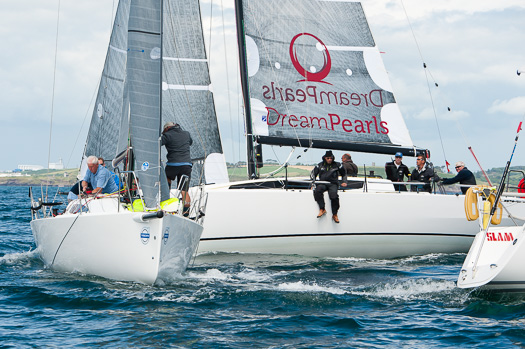
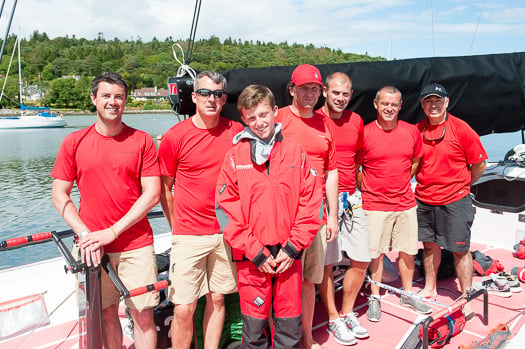
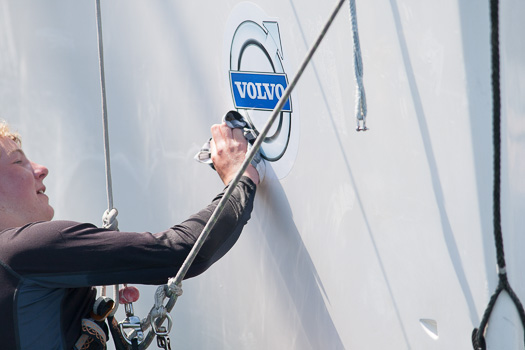
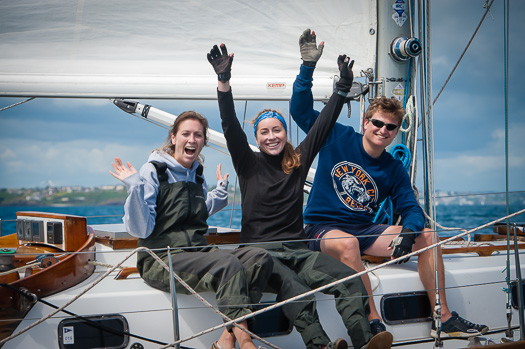
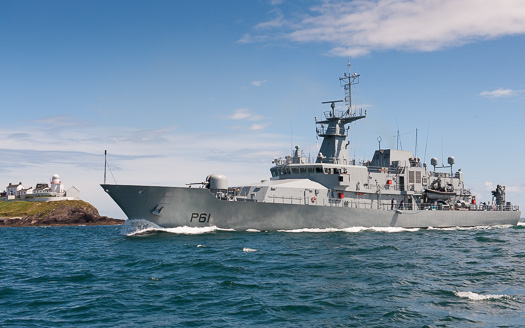
Volvo Cork Week 2014 Officially Opens At Crosshaven
#CorkWeek – With a fleet of just over 100 boats, yesterday's official opening of Volvo Cork Week at Royal Cork Yacht Club was a proper parade of sail as the competitors readied their vessels for the days of racing ahead.
Members of the public turned out in droves to see the boats and enjoy the festivities of Sunday's open day, including fun fair rides and an open-top bus shuttle between the Royal Cork and Camden Fort Meagher taking in the breathtaking vistas of Cork Harbour.
Later came the official opening of Volvo Cork Week by Marine Minister Simon Coveney, together with VCW chair and club vice admiral John Roche and admiral Pat Lyons.
But Cork Week is about the action on the water, and it got off to a rapid start yesterday morning with the PYR Race Dash for Cash, which boasted a prize fund of €1,000.
The tightly fought battle saw Peter McCann with crew Arran Walsh, sailing a 420, emerge victorious to take the first prize of €500.00.
They were followed in second and third place respectively by John Downey and Sandy Remmington, and Alex Barry and Richard Leonard, both sailing RS400s.
As previously reported on Afloat.ie, it's set to be a challenging yet rewarding week ahead across the fleets, and particularly so in the big boat class as several Ker 40s will be gunning for new British IRC Nationals champion Antix.
#volvocorkweek – A brief look over the entry list for Volvo Cork Week would suggest a challenging week ahead as the various fleets look forward to a competitive and enjoyable week of sailing at Royal Cork writes Claire Bateman. At the cutting edge in the big boat class there are several Ker 40's including Marc Glimcher's Catapult visiting Cork for the first time and Andy Williams' Keronimo a return visitor to Cork since 2013 with her distinct and easily recognizable 'HH' on the bow. Both these yachts will have to compete with Anthony O'Leary's Ker 39 Antix, just fresh from her victory at the British IRC National Championships. Also in this highly competitive grouping is Richard Matthews' highest rated boat in the fleet, GP42 Oystercatcher, accompanied by her mother ship the beautiful 125 ft.Oyster "Twilight".
Things don't get get any easier for those in Class Two with Conor and Denise Phelan's Ker 37 Jump Juice, fresh from her victory in the ICRA Nationals. She will have to compete with the Dowling/Boyd Quokka currently tuning up for her participation in the Irish Commodores' Cup Team. One should not underestimate the new X boat the Findlay/Anderson Roxstar who recently made her debut in Irish waters at the ICRA Nationals and with several First 40's adding to the mix, and a J120 to boot, should make for interesting competition.
Class Three, always a highly competitive class, includes nine J109's including Liam Shanahan's Ruth, pipped by seven minutes for a win in the recent Round Ireland, but she will have to compete with Ian Nagle's Jelly Baby also fresh from her recent win at the ICRA Nationals. Despite a recent disappointing performance at ICRA Nationals, one should never ignore the well sailed Robert McConnell's A35 Fool's Gold who certainly has the capacity to cause a major shake up.
Class Four will have its share of fiercely competitive and dedicated racing sailors including rivals Deasy/Desmond/Ivers Bad Company and T.E. Crosbie's No Excuse. Also included in this grouping will be the Dominic Losty IIlles Pitiuses, fresh from her recent Coutts Quarter Ton Cup Corinthian Victory and Judy McGrath's Hunter Impala Bonanza helmed by Barry Rose.
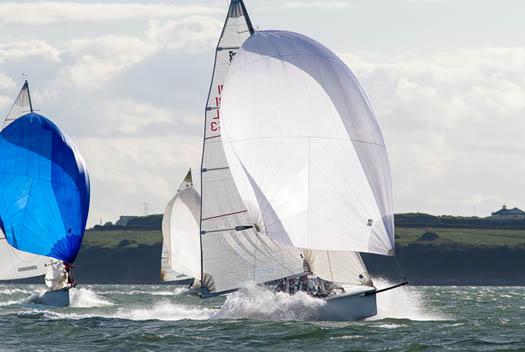
Royal Cork's own1720 class will be ar Volvo Cork Week, Photo: Bob Bateman
Now we come to the clash of the Sports Boats! Three Viper 640R's are making their way to Volvo Cork Week. This 21ft. sports boat, a very dinghy like boat, allows hiking and with the build having been taken over by Rondar since 2006, sports a carbon rig. These welcome visitors will compete with our own 1720s which made their first appearance in the April League 1994.
The White Sail fleet will sail in two classes on specially designed courses and it would be a brave person would make any pronouncements on who might emerge on top as this class appears to become more competitive with each passing day.
Practice Race Monday (7th). Official racing will commence Tuesday with the entire Volvo Cork Week Fleet competing in the hugely popular race that includes the highlight of a spectacular mark rounding off Cobh.
Indeed a mealy mouthful of racing to be enjoyed during the coming week.
Royal Cork Yacht Club Celebrates ICRA Success On Dublin Bay
#rcyc – Cork sailing prowess was marked at the Irish Cruiser Racing (ICRA) National Championships hosted by the Royal Irish Yacht Club in Dublin last weekend when Royal Cork yachts took both class zero and one to win ICRA's team prize writes Claire Bateman
Denise and Conor Phelan were victorious in Jump Juice Class Zero. Ian Nagle's Jelly Baby won Class One in a very competitive fleet that included J109s, A35's and others. George Kenefick in Nathan Kirwan Trust took second overall in Class Three while Paul Tingle also flew the flag with his Corby 25 Alpaca.
#rorc – Royal Cork's Anthony O'Leary's Ker 39, Antix has won the prestigious British IRC Championship title on the Solent this afternoon. Despitere being one of the smallest boats in Class one the Munster crew continued their impressive display, winning the first two races of the day to secure the IRC One title, and third place in the last race of the regatta was just enough to secure the overall win. Antix was crowned RORC IRC National Champion to the delight of the Irish crew.
It's an important result scored at an important time only weeks ahead of the Commodore's Cup where O'Leay will captain a three boat Irish team against some stiff international competition. Tonight, O'Leary's result was being toasted at his Royal Cork Yacht Club but the international result was also saluted in Dublin where the Irish IRC and ICRA championships were concluding at the Royal Irish Yacht Club.
The most sensational finish in the 13-year history of the RORC IRC National Championship played out in the central Solent this afternoon. In the tightly packed combat zone, the prize of overall national champion was decided in the ninth and final race of the series. Three yachts swapped the overall lead during the last three races. Keeping in clear air and playing the shifts were the big factors towards a top performance but maintaining concentration, in an adrenalin packed final day, was just all important.
"Antix has been coming here for years, we have won class here before but this is the first time we have won the event overall - it is just tremendous," smiled Anthony O'Leary. "Dave Lenz did a phenomenal job on tactics and the rest of the crew have been together for many years and that understanding kept our manoeuvres clean. The combination of smart strategy and good boat handling was the key. As one of the smallest boats in our class, we knew that we would be dictated to at the starts, and on several occasions, we did have to tack away for clear air. However, our heads never went down, and many-a-time we were in good shape by the top mark. This is a confidence boost for the Commodores' Cup but our feet will be firmly on the ground and we will continue to prepare for next month's big event."
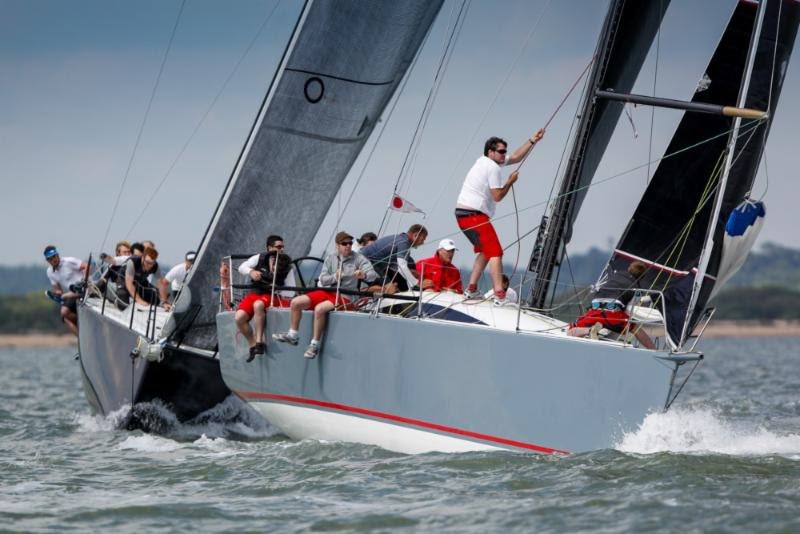
Cork's Antix in the lead on the Solent this aftenoon. Photo: Paul Wyeth
Mike Bartholomew's South African GP42, Tokoloshe II, was second in class and Marc Glimcher's American Ker 40, Catapult, finished the regatta in style winning the last race to place third.
IRC Two
Going into the last race, Jim Macgregor's British Elan 410, Premier Flair, needed to win to secure the overall IRC National title by just half a point. However, the team from Poole YC could only manage fourth. Premier Flair was class champion and second overall, winning the Jackdaw Trophy.
IRC Two produced a highly competitive fleet with seven yachts all scoring podium finishes and virtually every race was decided by seconds, so close in fact that Premier Flair and Adam Gosling's Corby 36, Yes!, scored a dead heat for Race 7. Kevin Miller's Scottish First 40, Zephyr, held on to second place for IRC Two. Yes! damaged their backstay in Race 8, ending any remote chance of a class win, but first in the last race of the regatta secured Yes! third in class.
"To be honest, if Yes! had not had their problems, we would have been beaten," admitted Jim. "The competition in our class this year was as good as I can remember and we are delighted to be taking the Jackdaw Trophy back to Poole YC. We had no idea we were in the running for the overall win, that comes as a bit of a shock for a Corinthian team. We were just taking it one race at a time, and thoroughly enjoyed every one of them."
IRC Three
David Franks' British JPK 10.10, Strait Dealer, won all three races today to secure the class. Scoring six bullets during the regatta, Strait Dealer was an outstanding performer. However, the smaller class size put the team from Cowes out of the running for the overall win. Last year's IRC Three champion, James Chalmers' British J/35, Bengal Magic, was second and Willem Schopman's Dutch Bashford Howison 36, Intention, was third.
"This is our second class win at the championship but every year it gets harder and harder," commented David. "The RORC have put on another excellent event, especially in difficult conditions, and that should not be underestimated. Each day was very different and all of the Solent came into play, at one stage or another, which kept us all thinking, as well as the race officer."
IRC Four
Peter Morton's Half Tonner, Swuzzlebubble, was the winner of the class but struggled today in the fresher breeze. Giovanni Belgrano's Whooper won the first race of the day and secured second overall. Sadly, Ian Southworth's Hamble based Quarter Tonner, Whiskers, was unable to race after yesterday's rig damage, but after being awarded redress, ended the regatta third in class. Michael Kershaw's Half Tonner, Chimp, won Race 8 and last year's class winner, Nick and Adam's J/97, Indulgence, finished the regatta on a high, winning the last race.
"This is the first big regatta for the boat since it was re-launched and we have learnt a lot about how to sail her," commented Peter Morton, skipper of Swuzzlebubble. "We were joined this weekend by Tom Schnackenberg, who has won the America's Cup three times and knows a hell of a lot about these boats. I bought Swuzzlebubble for one euro, I have spent a lot of money on her, but about only half the cost of some of the boats racing this weekend. She definitely goes well in the light but against the displacement boats, we suffered in more breeze."
Racing with the Royal Ocean Racing Club continues with the Morgan Cup Race on Friday 27th June, followed by the Round Ireland Race, Saturday 28th June.
Click HERE for full provisional results for the RORC IRC National Championship.
#wmr – The Petit Final led off today and provided a brilliant introduction to the display of match racing that was enthralling for the spectators to watch today writes Claire Bateman. Caroline Sylvan (SWE) put up a tough fight against Stephanie Roble (USA), but the American crew proved to be strongest at the end. With two straight wins they secured the bronze in the 2014 ISAF Women's Match Racing World Championship, the first event out of five on the 2014 Women's International Match Racing Series.
Finally the climax of this outstanding match racing event arrived and all were waiting with bated breath expecting a tremendous fight that lived up to all expectations and provided a display unequalled on the Cork Harbour scene for a number of years. Following a short delay to allow for the swopping of Stephanie Roble's (USA) boat, who in fact had come third in the series thus taking the bronze spot, all was in readiness and the scene set for the epic battle of the week and this in fact was what it turned out to be. With SSW breeze of 15 to 25 knots, a flooding tide, sunshine and shifty winds Anna Kjellberg of Sweden, World No. 2 and Camilla Ulrikkeholm World No. 1 entered the ding dong competition.
Ulrikkeholm gained an early advantage by winning the first match of the final. The flukey winds together with the flooding tide and strong current, really put it up to the sailors who gave it their all with a masterful display which was to last through the races for the final.
In the second match it was Kjellberg got through to victory and thus leaving it all to play for in match 3. Both teams started aggressively in race 3 with both clearly stating their intention to do the business. The Dane appeared to be in control of the situation when the Swede had a poor bottom mark rounding and it looked to be all over for her. However, the wily Swede went up the right side the beat and it paid off handsomely for her, taking the lead from the Dane and then held on in very tight circumstances and took the win.
Race 4 started with the tide turned. The start was again very aggressive with the Swede appearing to have the better of it. The wind seemed at it's strongest for this race. Both boats drag raced up the beat heading left. The Dane appeared marginally faster in the stronger conditions and got through. The pattern continued until the bottom mark when the Swede, who clearly wanted the right side of the course, threw a couple of dummy tacks to break the Dane's tight cover. Five minutes of racing later and it was all over bar the shouting. The smooth water on the right and a lucky shift took the Swede past the Dane and once through she never looked like losing and so it proved to be with the Swede taking the right hand side of the course downwind and gybing in the strongest breeze to power through to the finish and taking the winner's title in the final of the 2014 ISAF Women's Matching World Championships.
The prize giving followed in a very excited atmosphere with all very glad to be finished after a grueling week and showering the winner with congratulations and good wishes. A very lovely little human touch was added and made a perfect ending to the ceremonies when by kind permission of ISAF, Anna Kjellberg's little five week old daughter, Vera, was brought out to join with her mother to receive her very own gold medal to mark the auspicious occasion.
A wonderful end to a wonderful week.
ISAF Press Release
Olympic sailor and World #2 Anna Kjellberg of the Royal Gothenburg Yacht Club was crowned 2014 ISAF Women's Match Racing World Champion in Cork Harbour this afternoon. Together with her crew – Karin Almquist, Vanja Lundberg and Annika Carlunger – the Swede defeated Danish World #1 Camilla Ulrikkeholm (DEN) 3 – 1 in their Scandinavian battle off Crosshaven, the home of the world's oldest yacht club.
"This is absolutely incredible. We've never before sailed a regatta with such a great crew feeling," the Swedish skipper smiled. "The last few weeks of my life have been completely crazy, giving birth to my daughter just five weeks ago, and now this," she said, laughing and shaking her head.
With three victories needed to win the final of the 2014 ISAF Women's Match Racing World Championship, Ulrikkeholm gained an early advantage by winning the first match of the final. Strong but very shifting and puffy winds, together with a swift current, put the sailors to the test. The second meeting ended in a fierce fight around the course, but Kjellberg kept control and passed the finish line one boat length ahead of her opponent.
When the Swedes won the third match, they put Ulrikkeholm under great pressure to break back. In the fourth match the Danes got away ahead, but didn't cover the Swedes well enough on the second upwind. Kjellberg was allowed to tack away for clear air, found an advantageous wind shift and passed into a leading position which she was able to maintain to the finish.
"We've improved in every match during this regatta, and we know that in match racing it's never over until it's over. I think we had the right nerves today, with a rather calm feeling in the boat even when the competition was tough," Kjellberg analysed after her golden match.
On her loss Ulrikkeholm commented, "In these conditions it was hard also to be ahead. We made some mistakes not covering the Swedes enough, and then we didn't have as good boat handling as the other days of the regatta."
Kjellberg's bowman Annika Carlunger had no less than seven World Championship silver medals before this regatta, sailing with different helmsmen over the years. Now she got her eagerly awaited gold medal and shouted after having passed the finish line, "Finally, after all these years."
In the Petit Final Caroline Sylvan (SWE) put up a tough fight against Stephanie Roble (USA), but the American crew proved to be strongest at the end. With two straight wins they secured the bronze in the 2014 ISAF Women's Match Racing World Championship, the first event out of five on the 2014 Women's International Match Racing Series.
"We never felt comfortably in control, but my team did an awesome job all the way around the course," said Roble who praised her crew.
"We've done some fantastic races, and we're proud to be the second Swedish crew in the top four of this Championship," Sylvan smiled, not too disappointed.
Results in the 2014 ISAF Women's Match Racing World Championship, the first event out of five on the 2014 Women's International Match Racing Series:
Final:
Anna Kjellberg, SWE, defeated Camilla Ulrikkeholm, DEN, 3 – 1
Petit final:
Stephanie Roble, USA, defeated Caroline Sylvan, SWE, 2 – 0
Total results (skipper name, country, prize money, WIM Series points):
1. Anna Kjellberg, SWE, 3 000 €, 25
2. Camilla Ulrikkeholm, DEN, 2 000 €, 22
3. Stephanie Roble, USA, 1 500 €, 20
4. Caroline Sylvan, SWE, 1 250 €, 16
5. Anne-Claire Le Berre, FRA, 1 000 €, 15
6. Klaartje Zuiderbaan, NED, 750 €, 14
7. Lotte Meldgaard Pedersen, DEN, 500 €, 13
8. Claudia Pierce, NZL, – ,12
9. Annabel Vose, GBR, – , 10
10. Mary O'Loughlin, IRL, – , 8
11. Laura Dillon, IRL, – , 6
12. Lucie Scheiwiller, FRA, – , 4
13. Anne-Christianne Kentgens, NED, – , –


























